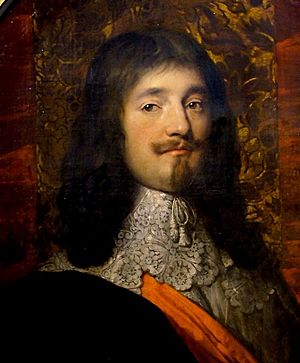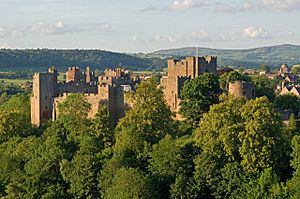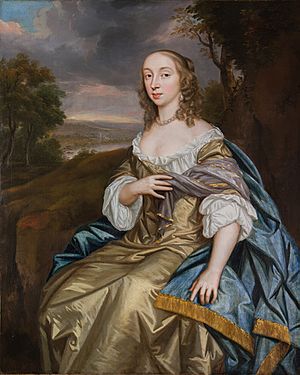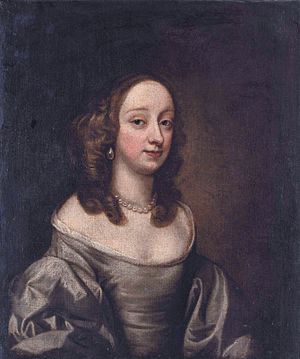Richard Vaughan, 2nd Earl of Carbery facts for kids
Quick facts for kids
Richard Vaughan
|
|
|---|---|
 |
|
| 2nd Earl of Carbery | |
| Reign | 1634–1686 |
| Predecessor | John Vaughan, 1st Earl of Carbery |
| Successor | John Vaughan, 3rd Earl of Carbery |
| Born | c. 1600 |
| Died | 1686 |
| Buried | Llanfihangel Aberbythych |
| Spouse(s) | Bridget Lloyd Frances Vaughan Alice Vaughan |
| Issue | Francis John Vaughan, 3rd Earl of Carbery |
| Father | John Vaughan, 1st Earl of Carbery |
| Mother | Margaret Meyrick |
Richard Vaughan, 2nd Earl of Carbery (around 1600 – 1686) was an important Welsh nobleman and soldier. He was known as Lord Vaughan before he became the Earl of Carbery. He played a role in English politics and the English Civil War.
Richard Vaughan was born into a noble Welsh family. His father held a special Irish title called a peerage. Richard first became a Member of Parliament (MP) for Carmarthenshire in Wales in 1624. He stayed an MP until 1629. This was when King Charles I decided to rule without Parliament for a while.
In 1626, Richard was made a Knight of the Order of the Bath. He didn't seem very interested in politics at first. When his father passed away in 1634, Richard inherited his family's lands and titles. He then mostly lived a quiet life in South Wales.
However, the English Civil War began in 1642. This changed everything. Both the King and Parliament wanted his support. Richard decided to join the King's side, becoming a Royalist. He gathered soldiers for the King. He also took control of the southern Welsh counties for the King. For his loyalty, he received more titles and responsibilities.
Richard's success as a soldier didn't last long. He wasn't a natural military leader. Within a year, he was fighting against Parliament's supporters in his own counties. Soon after, he gave up his command. He spent the rest of the war in retirement. He managed to avoid a big fine from Parliament. He also refused to get involved in any more fighting.
After the King was restored to power in 1660, Richard was back in favor. He received several important local jobs. Later in his life, he supported writers and thinkers. He hosted the religious writer Jeremy Taylor at his home, Golden Grove. He also hosted the poet Samuel Butler at Ludlow Castle. A problem with how he treated his servants later forced him to give up some of his jobs. He spent his final years living quietly.
Contents
Early Life and Family Background
Richard Vaughan was the older of two sons. His father was John Vaughan, 1st Earl of Carbery. His mother was Margaret Meyrick. When he was young, Richard traveled to other countries. In 1622, he visited Madrid, Spain. He might have gone with his father and the Prince of Wales. This trip was for a planned marriage that didn't happen.
Starting a Career in Politics
Richard Vaughan became a member of the English House of Commons in 1624. He represented Carmarthenshire. His father had been the MP for this area before him. Richard served until 1629.
In 1626, during the crowning of King Charles I of England, Richard was made a Knight of the Order of the Bath. This was a special honor. He also held important local government roles. He became the main record keeper for Carmarthenshire in 1630. He later held similar roles for Pembrokeshire and Cardiganshire. He kept these jobs until 1646, when the King's rule was interrupted.
Role in the English Civil War
In 1634, Richard became the Earl of Carbery after his father died. This meant he joined the Irish House of Lords. He didn't take a big part in politics at first. When the Civil War started, both the King and Parliament weren't sure whose side he was on. They both tried to get him to join them.
In February 1642, Parliament made him a lord lieutenant for Carmarthenshire and Cardiganshire. They asked him to help prepare the local soldiers. But Richard chose to support the King. In January 1643, he and his uncle, Henry Vaughan, raised a group of soldiers. They marched to support the King in Oxford.
On April 4, the King rewarded Richard for his loyalty. He made him the lieutenant-general for Carmarthenshire, Cardiganshire, and Pembrokeshire. Richard was sent to make sure these areas supported the King. It was easy in Carmarthenshire and Cardiganshire. But in Pembrokeshire, the port towns of Tenby and Pembroke supported Parliament. Richard didn't want a direct fight. He made a temporary peace with the towns. He then waited to see what would happen next.
Securing Key Ports
By October 1643, King Charles had made peace in the Irish Rebellion of 1641. He wanted to bring his army from Ireland to England. Irish soldiers might also come to help him. This made the Pembrokeshire seaports very important. Richard was told to take control of them for the King.
He did this by getting the local noble families in Pembrokeshire to support the King. He also threatened to attack the towns. Because of this, Tenby surrendered on August 30. Pembroke also surrendered by October 24. The King rewarded Richard for his success. On October 24, he made him Baron Vaughan of Emlyn. This gave him a title in the English peerage. It also allowed him to sit in the English House of Lords. On November 17, he was made governor of Milford Haven. This gave him control over Pembroke and its sea routes.
Challenges and Retreat
Richard's victory didn't last long. Parliament's forces in Pembroke rose up. Their leader was John Poyer. Richard had to fight back. He wasn't a skilled soldier. He could only call out his local soldiers and try to surround Pembroke. He hoped to starve the town into giving up.
But the Parliamentarian forces fought back. They received supplies by sea. Then they attacked the King's strongholds around them. Their forces were led by Rowland Laugharne. Richard couldn't stop them because he didn't have enough mobile soldiers. Soon, he lost Tenby. By March 1644, he had lost all of Pembrokeshire.
Richard was called back to explain what went wrong. Things got even worse after he left. Parliament's forces took control of Carmarthenshire and Cardiganshire. Richard was found not guilty of blame. But he had to give up his military command. It was given to Sir Charles Gerard. Richard was told to be Gerard's adviser. He returned to Wales in May 1644. But he seems to have stopped taking an active part in the war after that.
Life After the War
After the war, Parliament wanted Richard to pay a large fine. It was £4,500. Surprisingly, his former enemy, Laugharne, argued against the fine. He said Richard could be a useful supporter of Parliament in the area if they treated him well. Richard also went to Parliament to argue against the fine. Other important people, like Sir John Meyrick and the Earl of Essex, spoke for him. On February 16, 1646, the House of Commons decided to cancel the fine. This was made official by April 9, 1647.
Richard mostly lived a private life. He refused to support the revolt against Parliament in South Wales in 1648. This revolt was led by his former enemies, Laugharne and Poyer. Richard's decision saved him from further trouble with the government. He and his second wife lived quietly at their family home, Golden Grove. During this time, they hosted the religious writer Jeremy Taylor. Taylor wrote many of his famous works, including The Great Exemplar, while staying with Richard.
After the King's Return
When the King was restored to power in 1660, Richard got his old job back as a record keeper. He was also made Lord President of Wales. He was given several other important roles in Wales. In 1661, Richard joined the Privy Council of England. This was a group of important advisers to the King. In 1670, he again became the main record keeper for Cardiganshire.
Richard was Lord President and Lord Lieutenant of Glamorgan until 1672. He faced accusations of treating his servants badly. Because of this, Henry Somerset, 1st Duke of Beaufort took over both jobs. A year later, the Duke also took over Richard's roles as Lord Lieutenant of Anglesey and Lord Lieutenant of Brecknockshire.
While Richard was president, he was also in charge of Ludlow Castle. He hired his secretary, the poet Samuel Butler, to manage the castle. Butler wrote the first part of his famous poem Hudibras there. Even though he lost some of his jobs, Richard kept his record-keeping roles until he died in 1686. He was buried at Llanfihangel Aberbythych 12 days later.
Family Life
Lord Carbery was married three times. His first wife was Bridget Lloyd. After Bridget died, he married Frances Altham. They married in Acton, London, on August 8, 1637. Frances was the daughter of Sir James Altham. They had three sons named Francis, John, and Altham, and one daughter.
Frances passed away in 1650. Two years later, Richard married his third wife, Lady Alice Egerton. She was the daughter of John Egerton, 1st Earl of Bridgewater.
Richard, the Earl, died in 1686. His second son, John, inherited his titles. Richard's oldest son, Francis, was an MP for Carmarthen. But Francis died before his father in 1667. Richard's last wife, Alice, lived for three more years after he passed away.
 | James Van Der Zee |
 | Alma Thomas |
 | Ellis Wilson |
 | Margaret Taylor-Burroughs |




